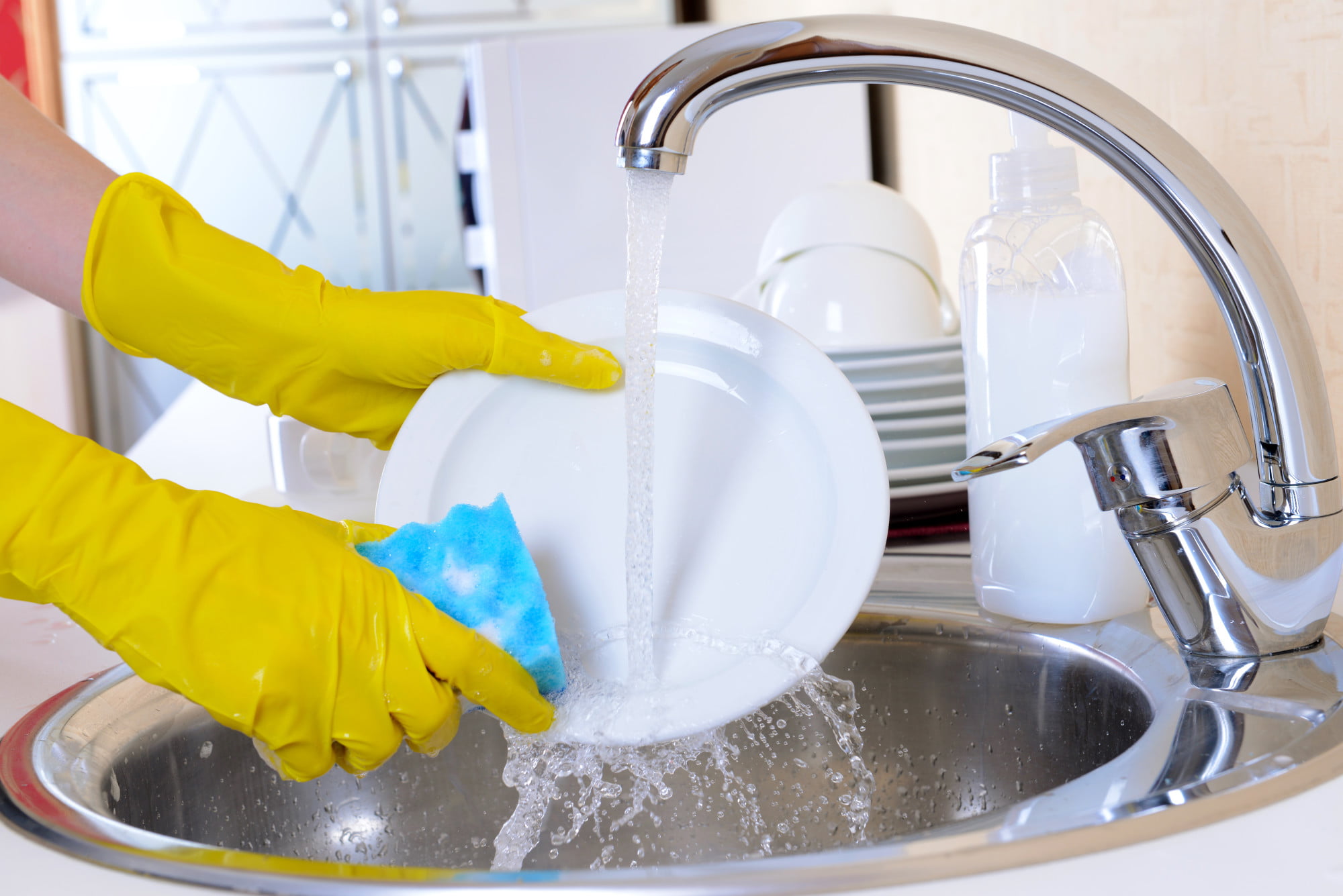Washing the dishes is a household chore that nobody is free from. Whether you’re the proud owner of a dishwasher or someone who does things by hand, you have to take care of your dishes.
The only time that you’re immune from washing the dishes is when you can afford to pay someone to do it for you. For most, that only happens when we go out to eat. Others are afforded that luxury at home.
We’re going to take a look at how to wash dishes effectively in this article, giving you some insight into the way to get it done right. You might think you already know, but it never hurts to get a little more information on how to complete basic tasks.
Let’s get started.
How to Wash Dishes: The Guide You Need
To start, we have to acknowledge the fact that we all, from time to time, leave dishes to sit. Most of the time, the excuse we give is that they need to “soak,” or that we’ll get to them later.
Deep down in the bottom of our hearts, though, we know that those excuses are just reasons to escape the task of doing dishes. It’s confusing that we do this, though, because most people report that completing the dishes makes them feel pretty good.
Once you get the ball rolling, you’re rewarded by the fact that you propelled yourself to do something that’s good for you. Self-care is important, and doing the dishes absolutely fall into that category.
That said, we’ve all got enough amnesia to let that fact slip our minds from time to time. This brings us to the first step of doing the dishes right.
1. Do Them as Soon as Possible
You don’t have to do the dishes when your company is still eating or if you’ve got something important to do. That said, you know when your earliest convenience is.
You might make a little excuse here or there to watch another episode or complete other tasks first, but the dishes remain. The best bet is to do them as soon as you can, every time, without exception.
This establishes a habit. That way, you’ll be compelled to do the dishes and get them off of your mind before you have any time to worry about the fact that you’re putting them off.
What’s more, is that doing them right away solves a couple of problems for you. First, the food on your plates and bowls won’t have any time to get hard if you do the dishes right away. Some foods harden quickly, making it more of a hassle to get around to them.
The harder your food gets, the longer it will take you to do the dishes. Therefore, you’ll put off doing them longer.
The second thing that speed solves is the fact that you won’t allow bacteria time to develop. Bacteria exist in our food, our drains, and pretty much anywhere you can imagine. It takes a little time for them to multiply, though.
So, you’ll keep them from spreading by getting to the dishes right away.
2. Use Anti-Bacterial Soap
Just because the dishes look clean when you use a wet rag doesn’t mean they always are. Bacteria and germs are tiny, microscopic things that have a way of sticking to dishes.
It’s important to use soap like joy soap to get all of the bacteria from your plates. When you don’t, there’s no telling whether bacteria all comes off and you might get sick. Further, soap helps to speed up the process of cleaning.
Soap cut through oil and grime to loosen things up and make your dish-washing process a lot smoother.
You also get the advantage of sweet-smelling sinks and dishes when you’re done. Your hands won’t smell like old bathwater, and you’ll be pleased to walk through the fragrant kitchen for a few hours after.
3. Change Out Utensils Often
There are some long-lasting dish cleaners out there, but most of the utensils we use should be swapped out just before it’s clear that they’re old.
By that, we mean that the old sponge sitting on your sink might be past its time. Sponges and rags pick up bacteria as they scrub your dishes. That’s what they’re supposed to do.
That said, we don’t always ring all of the bacteria out when we’re done with the dishes. Things stick around, and you can tell by the strange smell that starts to build on the utensil you have.
It feels like a waste to get rid of them, though, because they might still be effective at cleaning grime off of the dishes. In reality, there’s no shame in throwing away an old sponge when it has done its job.
They’re cheap, and they aren’t made to be used every night for a period of six months. Do yourself the favor of switching out your sponge or rag every couple of weeks, and make sure to clean them thoroughly after you finish each set of dishes.
4. Allow Dishes to Air or Towel Dry
Another mistake that a lot of people make is shoving dishes into the cupboard right after they’ve been washed.
Bacteria are attracted to moisture, and leaving wet dishes in the cupboard is an invitation for bacteria to multiply. Do your best to wipe the dishes off with a dry towel if you’re in a rush to put things into the cupboard.
Ideally, though, you will wipe the dishes off with a dry towel then allow them to dry in the open air. Then, you can place them in the pantry without any worry that they’re going to pick up new bacteria.
Further, try to place your cups and bowls faced down in the pantry. This is especially true if you’ve only used the dry towel to wipe them without leaving them out in the open.
Placing dishes downward allows a small amount of moisture to drain out. If you’re thorough with the dry rag, that moisture won’t be significant enough to make a difference to the wood in your pantry.
That small amount can sift down, puddle, and allow bacteria to grow. That moisture is better in the wood than it is sitting on your dish for who knows how long.
5. Wipe Off Longstanding Dishes
The dishes that have been sitting in your pantry for a long time deserve a little cleaning before you use them again. It’s best to use soap when you give these dishes their rinse, but some hot water will do the trick.
This is just to prevent any germs, debris, or bacteria from sitting on the plate and interfering with your food. That could affect flavor, but it’s more likely that the bacteria could be harmful if the plate has been sitting for a long period of time.
It’s not a bad idea to wipe off all dishes that you use from the cupboard. The material of your pantry, bacteria left on the shelf, and other contaminants could all come into play and affect your food.
6. Shake Off Mistakes
This sounds like advice that a coach would give an athlete, but it’s true.
The dishes are notorious for being disastrous to a person’s mental health. The dishes sit, and the mind starts to crumble. People think of dirty dishes as a sign that they’re letting their lives slip and might not be taking care of themselves as well as they should be.
If you have the slippery slope type of anxiety, you know what we’re talking about. That said, it doesn’t have to feel that way. Everyone gets busy, and not everyone has the motivation or energy to take care of all of their tasks every time.
It’s human to make those little blunders, and they might not even be blunders considering how many other responsibilities we have. So, if you find that your dishes aren’t getting done, don’t sweat it so much.
The more anxiety that surrounds the dishes, the more anxious you’ll be in other areas of your life. At the end of the day, they’re just dirty dishes. They don’t reflect a deeper issue or the idea that you’re slipping up!
When you notice that the dishes aren’t getting done, try to do them right then. If you can’t get yourself to for whatever reason, don’t get down on yourself. You can try to do them a little later.
At the end of the day, they will get done. You need to use those plates at some point. If you can create the habit, that’s great.
If it takes you a few months or years to get into that habit for good, there’s no reason to be too hard on yourself about it.
Want to Learn More about How to Properly Wash Dishes?
Understanding how to wash dishes the right way is essential for a healthy lifestyle. It’s tough, though, and we get it. We’re here to help you with more ideas.
Explore our site for insight into dish washing tips, the best dish soap, and much more.




